

Developing An Assessment of Learning Process. Blending Formative and Summative Assessment in a Capstone Project. Formative Assessment and elementry school student academic achievement a review of the evidence. Tech-Based Formative Assessment. How do you check for understanding in your classroom?
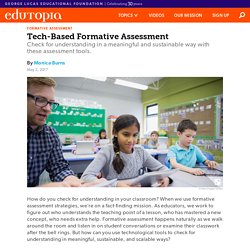
When we use formative assessment strategies, we’re on a fact-finding mission. As educators, we work to figure out who understands the teaching point of a lesson, who has mastered a new concept, who needs extra help. Digital Assessment Tools: What Is Their Impact On A Teacher's Work? Online educational technologies are gaining speed year by year.
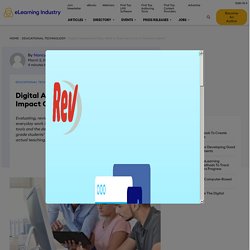
Students get more and more convenient with them, and paper testing is losing its importance and necessity when we talk about knowledge evaluation. Learning Management Systems and feedback tools - these digital instruments are aimed to provide students with fast and fair assessments directly after taking a test. How I Got Started Using Technology To Assess Student Learning. How I Got Started Using Technology To Assess Student Learning by Rachelle Ploth If you are looking for another way to integrate technology into your classroom, why not start with assessment?
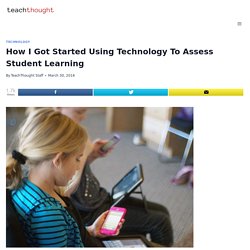
Formative Assessment Is Reshaping Education During Covid-19. In today’s new environment of online, remote learning, the need for teachers and school administrators to get immediate feedback on student progress is of paramount importance.
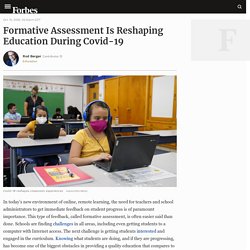
This type of feedback, called formative assessment, is often easier said than done. Schools are finding challenges in all areas, including even getting students to a computer with Internet access. The next challenge is getting students interested and engaged in the curriculum. Knowing what students are doing, and if they are progressing, has become one of the biggest obstacles in providing a quality education that compares to traditional, in-seat learning.
To explore the nuances facing providers and consumers of educational content, I interviewed Kevin McFarland, COO of Formative, to discuss the origins of his company and how they have adapted during Covid-19. Fantastic, Fast Formative Assessment Tools. “We’ve got this, it’s easy,” they said. “Can we move on?” I looked at the other students and asked, “Do you have this?” They nodded their heads furiously up and down in a yes. My teacher instincts said that everyone knew it, but I decided to experiment, so I wrote a problem on the board. Students were already logged in to Socrative, and a box opened up on their screens. Hit the Mark With Digital Media Exit Cards. In my first year of teaching English, I had to teach prepositions to sixth graders.
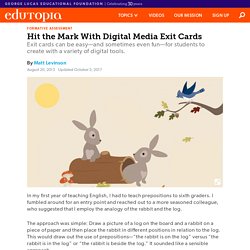
I fumbled around for an entry point and reached out to a more seasoned colleague, who suggested that I employ the analogy of the rabbit and the log. The approach was simple: Draw a picture of a log on the board and a rabbit on a piece of paper and then place the rabbit in different positions in relation to the log. This would draw out the use of prepositions—“the rabbit is on the log” versus “the rabbit is in the log” or “the rabbit is beside the log.” It sounded like a sensible approach. (CCE) Center for Collaborative Education. Recently, a teacher team from a middle school in Attleboro, MA, a small urban district, was participating in a two-day summer institute on designing high quality, curriculum-embedded performance assessments.
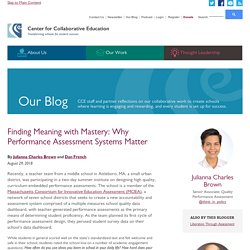
The school is a member of the Massachusetts Consortium for Innovative Education Assessment (MCIEA), a network of seven school districts that seeks to create a new accountability and assessment system comprised of a multiple measures school quality data dashboard, with teacher-generated performance assessments as the primary means of determining student proficiency. As the team planned its first cycle of performance assessment design, they perused student survey data on their school’s data dashboard.
While students in general scored well on the state’s standardized test and felt welcome and safe in their school, students rated the school low on a number of academic engagement questions: How often do you use ideas you learn in school in your daily life?